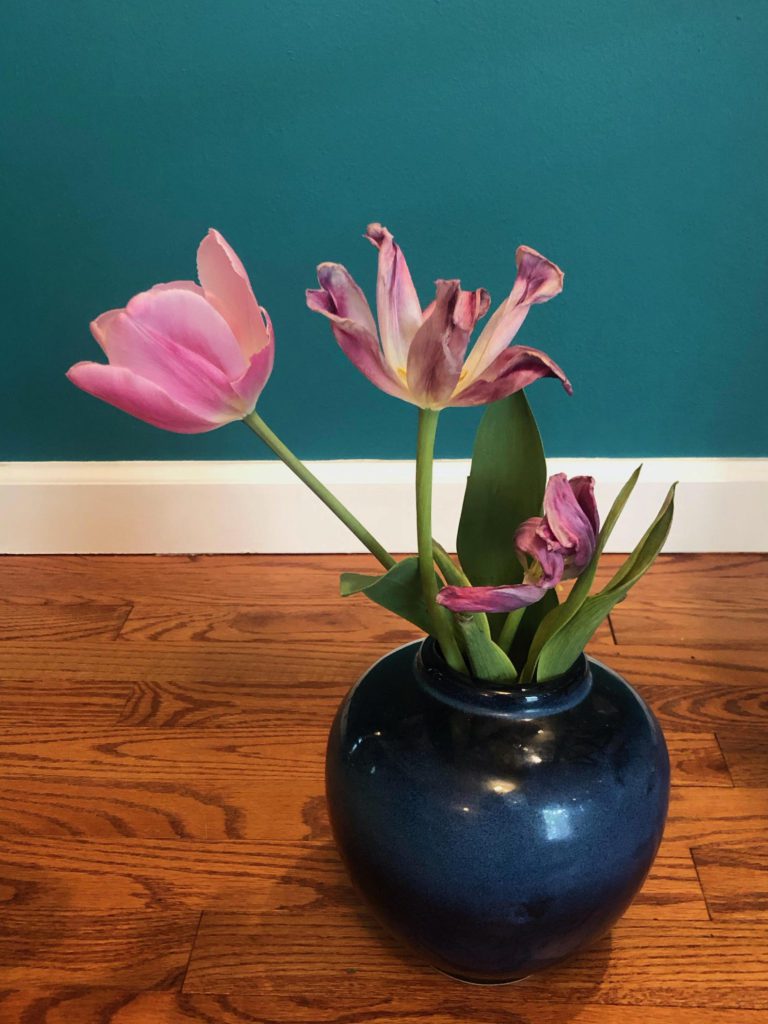
Our mother’s sister drove our Grandma Kitty from Detroit Michigan to Louisville Ky to live with our family when I was about 12. Grandma had already spent some time with each of mother’s two brothers and their families. As a nurse Mother had eagerly volunteered to take her turn as family caregiver in spite of the fact that she worked nights at the hospital, catching up on sleep during the day, had 5 children, and that she and her mother had never been close.
Grandma Kitty was the only official grandmother we had, the others having died before we were born but my four siblings and I, in spite of seeing her at family gatherings a couple times a year, didn’t know her very well. Her younger sister our Auntie was more grandmother to us than she was. As was common in those days, the reasons Grandma could not take care of herself were not talked about or shared with us. I can still see her small wobbly figure wrapped in a black coat and wool scarf, making her way down the driveway, never mind it’s a hot sticky day in Ky. She clutches her black leather purse stuffed with papers and some money. “Where you going Grandma?” we ask. I’m going to Springfield.” (the town in Ohio where she and my mother were born.)
By the time she would get to the front sidewalk we kids, in order to avoid the wrath of our father when he got home, had to figure out how to convince her to come inside. We had to tell that what she wanted was impossible, and that you can’t walk there from here anyway. It might have helped if we had known that due to hypertension and heart conditions common in her Irish linage, Grandma Kitty was experiencing confusion and memory loss –what would now be diagnosed as Vascular Dementia.
In 2020, 50 million people worldwide are living with some form of dementia, and there are 10 million new cases diagnosed each year. It’s understandable that on Worldwide Alzheimer’s Day last year, which is September 21st, the theme was “Let’s talk about it.”
We kids did talk about it among ourselves, and we wondered if this is what happens to people when they grow old? Will this happen to our parents? Will it happen to us? Grief experts call this anticipatory grief.
Accompanying my sister Pat six years ago for testing to determine if she had Alzheimer’s had been a project that took several years. Her symptoms did not fit neatly into the common categories and this lengthened the process of getting and accepting the news for both her and her loved ones. The reality of her impending loss finally hit her one afternoon when we were driving back to the university research center after a break for lunch. Her voice was timid but clear when from the back seat she said to my husband and me, “If I have this, I could lose myself.” After a couple of beats of silence, we agreed that she could.
As family members struggle to relate to and care for loved ones who are losing themselves, we experience a type of grief that Pauline Boss has named, Ambiguous Grief. Someone is physically present but psychologically gone from us. As I’ve been journeying with my sister these past dozen years, I’ve discovered another type of grief–a grief that springs from my love and compassion for her. As I grieve for myself and for the friendship we once had, I experience compassionate grief on her behalf, feeling the grief she is no longer able to feel for herself.
I was totally unhelpful as a child when my grandmother lived with us while experiencing dementia. Fifty years later when dear friend, Jyoti, nurse and manager of our clinic, began dealing with Alzheimer’s I learned much that has helped me with my sister. I learned that the spirit is still in the body and can be viewed and accessed intermittently in small and surprising ways. Jyoti always knew me, even after the ability to speak in words had gone from her. As she devolved and lost abilities gained and practiced through adulthood, she reclaimed a playfulness common to her younger self. We could still be in relationship though the nature of it changed dramatically.
This has happened with my sister as well. We now must meet on zoom through the Ipad held by her nurse. She isn’t quite sure why I’m showing up on the screen but she’s excited to see me. We laugh together about my Covid hair, now grown out to grey and silver, and she tells me she doesn’t like how her hair looks. I give her back some of herself by reminding her of things we’ve done together, scenes from her life that I was present for.
As the number of cases of dementia rise in the western world many people are beginning to question and connect that escalation with the proliferation of chemicals in our air, our soil and our oceans. A friend who writes under the name, Dylan Weiss turned her grandson’s fear of his grandfather suffering from Alzheimer’s into an allegory and children’s adventure story to save the forest. Her book Sebastian’s Tale asks the question–Why are the animals and people getting sick? What do we need to do about it?
For sure, it’s definitely time to talk about it.

